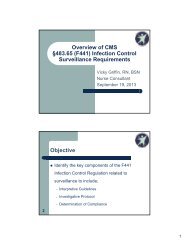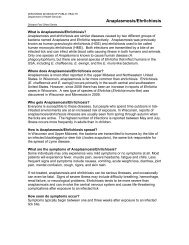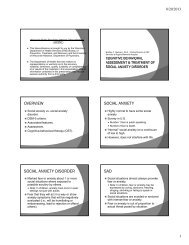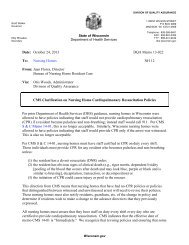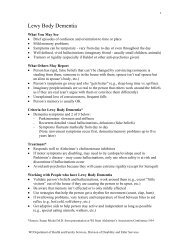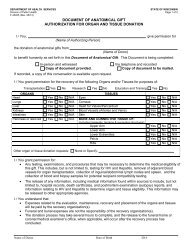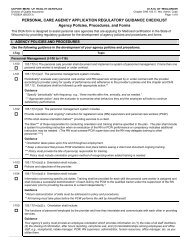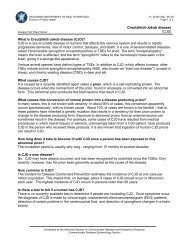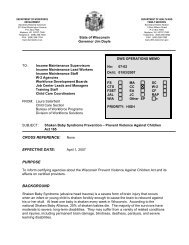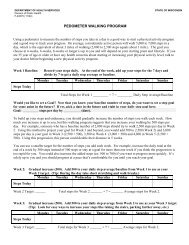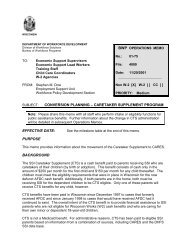Halcion - Wisconsin Department of Health Services
Halcion - Wisconsin Department of Health Services
Halcion - Wisconsin Department of Health Services
Create successful ePaper yourself
Turn your PDF publications into a flip-book with our unique Google optimized e-Paper software.
F-24277 Page 2 Medication : <strong>Halcion</strong> - (triazolam)<br />
4. Possible side effects, warnings and cautions associated with this medication are listed below. This is not an all inclusive list but is<br />
representative <strong>of</strong> items <strong>of</strong> potential clinical significance to you. For more information on this medication, you may consult further with your<br />
physician or refer to a standard text such as the PDR or the United States Pharmacopoeia Dispensing Information (USPDI). As part <strong>of</strong><br />
monitoring some <strong>of</strong> these potential side effects, your physician may order laboratory or other tests. The treatment team will closely monitor<br />
individuals who are unable to readily communicate side effects, in order to enhance care and treatment.<br />
Continued – Possible side effects, warnings and cautions associated with this medication.<br />
More common side effects include: Clumsiness or unsteadiness; dizziness or lightheadedness; drowsiness; slurred speech.<br />
Check with your doctor as soon as possible if any <strong>of</strong> the following less common side effects occur: Anxiety; confusion (may be more common<br />
in the elderly); fast, pounding, or irregular heartbeat; lack <strong>of</strong> memory <strong>of</strong> events taking place after benzodiazepine is taken (may be more<br />
common with triazolam; mental depression.<br />
Other less common or rare side effects include: Abdominal or stomach cramps or pain; blurred vision or other changes in vision; changes in<br />
sexual desire or ability; constipation; diarrhea; dryness <strong>of</strong> mouth or increased thirst; false sense <strong>of</strong> well-being; headache; increased bronchial<br />
secretions or watering <strong>of</strong> mouth; muscle spasm; nausea or vomiting; problems with urination; trembling or shaking; unusual tiredness or<br />
weakness.<br />
Check with your doctor as soon as possible if any <strong>of</strong> the following rare side effects occur: Abnormal thinking, including disorientation,<br />
delusions (holding false beliefs that cannot be changed by facts), or loss <strong>of</strong> sense <strong>of</strong> reality; agitation; behavior changes, including aggressive<br />
behavior, bizarre behavior, decreased inhibition, or outbursts <strong>of</strong> anger; convulsions (seizures); hallucinations (seeing, hearing, or feeling<br />
things that are not there); hypotension (low blood pressure); muscle weakness; skin rash or itching; sore throat, fever, and chills; trouble in<br />
sleeping; ulcers or sores in mouth or throat (continuing); uncontrolled movements <strong>of</strong> body, including the eyes; unusual bleeding or bruising;<br />
unusual excitement, nervousness, or irritability; unusual tiredness or weakness (severe); yellow eyes or skin.<br />
WARNINGS<br />
Triazolam is a federally controlled substance (C-IV) because it can be abused or lead to dependence. Keep triazolam in a safe place to<br />
prevent misuse and abuse. Selling or giving away trizolam may harm others, and is against the law. Tell your doctor if you have ever abused<br />
or been dependent on alcohol, prescription medicines or street drugs.<br />
Because sleep disturbances may be the presenting manifestation <strong>of</strong> a physical and/or psychiatric disorder, symptomatic treatment <strong>of</strong> insomnia<br />
should be initiated only after a careful evaluation <strong>of</strong> the patient. The failure <strong>of</strong> insomnia to remit after 7 to 10 days <strong>of</strong> treatment may indicate<br />
the presence <strong>of</strong> a primary psychiatric and/or medical illness that should be evaluated. Worsening <strong>of</strong> insomnia or the emergence <strong>of</strong> new<br />
thinking or behavior abnormalities may be the consequence <strong>of</strong> an unrecognized psychiatric or physical disorder. Such findings have emerged<br />
during the course <strong>of</strong> treatment with sedative-hypnotic drugs. Because some <strong>of</strong> the important adverse effects <strong>of</strong> sedative-hypnotics appear to<br />
be dose related, it is important to use the smallest possible effective dose, especially in the elderly.<br />
Complex behaviors such as "sleep-driving" (i.e., driving while not fully awake after ingestion <strong>of</strong> a sedative-hypnotic, with amnesia for the<br />
event) have been reported. These events can occur in sedative-hypnotic-naïve as well as in sedative-hypnotic-experienced persons. Although<br />
behaviors such as sleep-driving may occur with sedative-hypnotics alone at therapeutic doses, the use <strong>of</strong> alcohol and other CNS depressants<br />
with sedative-hypnotics appears to increase the risk <strong>of</strong> such behaviors, as does the use <strong>of</strong> sedative-hypnotics at doses exceeding the<br />
maximum recommended dose. Due to the risk to the patient and the community, discontinuation <strong>of</strong> sedative-hypnotics should be strongly<br />
considered for patients who report a "sleep-driving" episode. Other complex behaviors (e.g., preparing and eating food, making phone calls, or<br />
having sex) have been reported in patients who are not fully awake after taking a sedative-hypnotic. As with sleep-driving, patients usually do<br />
not remember these events.<br />
Central nervous system manifestations: An increase in daytime anxiety has been reported for triazolam after as few as 10 days <strong>of</strong><br />
continuous use. In some patients this may be a manifestation <strong>of</strong> interdose withdrawal. If increased daytime anxiety is observed during<br />
treatment, discontinuation <strong>of</strong> treatment may be advisable. A variety <strong>of</strong> abnormal thinking and behavior changes have been reported to occur in<br />
association with the use <strong>of</strong> benzodiazepine hypnotics including triazolam. Some <strong>of</strong> these changes may be characterized by decreased<br />
inhibition, e.g., aggressiveness and extroversion that seem excessive, similar to that seen with alcohol and other CNS depressants (e.g.,<br />
sedative/hypnotics). Other kinds <strong>of</strong> behavioral changes have also been reported, for example, bizarre behavior, agitation, hallucinations,<br />
depersonalization. In primarily depressed patients, the worsening <strong>of</strong> depression, including suicidal thinking, has been reported in association<br />
with the use <strong>of</strong> benzodiazepines. It can rarely be determined with certainty whether a particular instance <strong>of</strong> the abnormal behaviors listed<br />
above is drug induced, spontaneous in origin, or a result <strong>of</strong> an underlying psychiatric or physical disorder. Nonetheless, the emergence <strong>of</strong> any<br />
new behavioral sign or symptom <strong>of</strong> concern requires careful and immediate evaluation. Because <strong>of</strong> its depressant CNS effects, patients<br />
receiving triazolam should be cautioned against engaging in hazardous occupations requiring complete mental alertness such as operating<br />
machinery or driving a motor vehicle. For the same reason, patients should be cautioned about the concomitant ingestion <strong>of</strong> alcohol and other<br />
CNS depressant drugs during treatment with triazolam. As with some, but not all benzodiazepines, anterograde amnesia <strong>of</strong> varying severity<br />
and paradoxical reactions have been reported following therapeutic doses <strong>of</strong> triazolam. Data from several sources suggest that anterograde<br />
amnesia may occur at a higher rate with HALCION than with other benzodiazepine hypnotics.<br />
See PDR, USPDI or US Hospital Formulary Service for all-inclusive list <strong>of</strong> side effects.<br />
Client Initial Date



